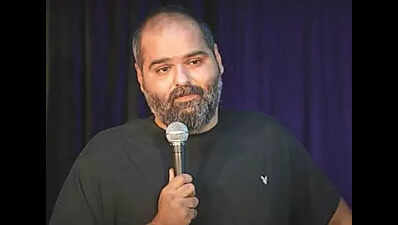- News
- City News
- mumbai News
- HC restrains cops from arresting Kunal Kamra
Trending
HC restrains cops from arresting Kunal Kamra
Mumbai: In major relief to stand-up comedian Kunal Kamra, the Bombay High Court on Friday restrained the police from arresting him and admitted his petition against an FIR filed by a politician against him for the show in which he allegedly referred to deputy CM Eknath Shinde in derogatory terms.
However, police are free to probe and even file a chargesheet, the HC said. If a chargesheet is filed during the pendency of the petition, the trial court is not to proceed against Kamra, directed Justices Sarang Kotwal and S M Modak.
You Can Also Check: Mumbai AQI | Weather in Mumbai | Bank Holidays in Mumbai | Public Holidays in Mumbai
The petition deserves serious consideration for issues concerning free speech and applicability of the cognizable offence invoked, said the court. The HC did not stay the probe as it was guided by the Supreme Court's landmark 2021 ruling against thwarting probes in cases that attract cognizable offences—crimes serious enough for police to register an FIR to initiate a criminal investigation.
Kamra, through senior counsel Navroz Seervai and advocates Arti Raghavan and Ashwin Thool, argued that the FIR registered against him at Khar police station in Mumbai for his satirical show disclosed no offence, was ‘motivated and malafide', and had a chilling effect on free speech. Seervai cited SC judgments to seek a stay on the probe even at a nascent stage. He argued that the show was a satire, and its content in the public domain, even mouthed earlier by politicians, had created no furore nor led to an FIR.
Kamra said police could record his statement via a video link since he had received 500 threats, including death threats. Police, he pointed out, had been a spectator when the venue for the show in Khar was vandalised.
The HC said some protection is due and observed that Kamra's counsel said the police can go to Chennai to record the statement, with reasonable notice.
Public prosecutor HS Venegaonkar, citing a law lexicon, said political parties with different ideologies and mass following would constitute a ‘community' and hence a cognisable offence of ‘public mischief' under section 353(2) of the new penal code—Bharatiya Nyaya Sanhita (BNS) —was invoked rightly in the FIR. The section deals with false statements, rumours, or alarming news to cause ill-will between different groups or communities.
However, Seervai said parties cannot be included in ‘communities'. As the SC said in a 1997 judgment, enmity or ill-will "between different" communities would require "at least two such groups or communities". "Merely inciting the feeling of one community or group without any reference to any other community" can't attract an offence of communal disharmony. He said at best only Shinde's party was referred to, none other.
The HC, observing a lack of judicial pronouncement on ‘communities', said, "it is necessary to interpret the scope of Section 353(2) of BNS which requires serious consideration." On allegations of defamation, invoked "rightly" as the PP contended, the HC said there is a special process to initiate prosecution for defamation which has to be followed.
Free speech and dissent are important for a dignified life in democracy and art and satire contribute to a meaningful human life, said Seervai. The State argued that dissent cannot exceed reasonable restrictions under the Constitution for decency, morality, and public order, and personal "malicious" attacks are not to be countenanced. The issues raised by both sides deserve serious consideration, said the HC, thus admitting the petition.

About the Author
Swati DeshpandeEnd of Article
Follow Us On Social Media








